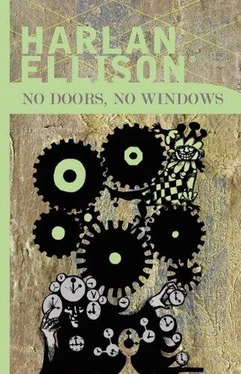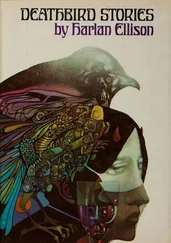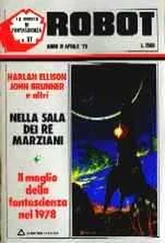To carry this helpful bit of public service data to its logical conclusion, for those budding authors among you who never had anyone lay such necessary but primitive information on you, as I discuss each story. I’ll insert its wordage in square brackets. Don’t thank me, just don’t send me your stories to read … I’ll only burn them.
“The Whimper of Whipped Dogs” [8000] is based on the murder of Kitty Genovese, about which I’ve nattered in books like THE DEADLY STREETS [Pyramid V3931]. The case is now so famous, it’s obsessed me for eleven years since it happened. Woman knifed to death in the streets of New York’s Kew Gardens section while thirty-eight people watched from their windows, heard her screams for help, did nothing, turned up their TV sets so the screams wouldn’t penetrate. It took the rapist-killer over half an hour to slice her up as she dragged herself around almost a full city block. They could have saved her. They didn’t I was never satisfied with the intellectual theories about why no one had aided her. It’s not the kind of dehumanized behavior that can be explained with phrases like “disinvolvement” or “alienation” or “inurement to the reality of violence from seeing so much death on nightly newscasts.” It was the kind of mythic situation that could only be explained in terms of magic realism, fantasy.
“Eddie, You’re My Friend” [1300] is a rarity. It’s an unsold story. I’ve written over 800 short stories and articles and essays and suchlike in my twenty years behind this machine, and with only one or two exceptions — dogs that embarrass me even to look at, which I’d fight to the death against letting appear in print — everything has sold to one magazine or another. But when I went through my files to put this book together, and read all those old stories, and picked only the best, I found “Eddie” and remembered it, and smiled and liked it. It’s not a particularly thoughtful story, just a little one-punch blowdart, but it worked, so I added it to the book. But when I went to locate the source of first publication, to enter it on the acknowledgment page where copyrights are listed, I couldn’t find any mention of its having been published. I consulted the exhaustive and elegant bibliography of my work assembled by Leslie Kay Swigart, but even she had no mention of the story. And I realized I’d assumed that story had been published, all these years. But it hadn’t. It was, in effect, a brand-new, unpublished yarn. And it appears here for the first time. (Unless, in the five and a half months between the time I write this page, and NO DOORS, NO WINDOWS is published, I manage to sell it to a magazine, in which case it will still be a new story as far as book publication is concerned.)
There isn’t much to say about “Status Quo at Troyden’s” [4600]; it speaks for itself. Except to say that if there was one reason why I wanted a book of my suspense fiction to get between covers, it was to preserve for “posterity,” or whatever, this one story. I don’t know why I’ve always thought highly of it, but I like it enormously. I think it has a lot of heart, and it was an early indication of where my interests and writing abilities were going. So now Mr. Huggerson and Harry Troyden and Mr. Zeckhauser will have some extended life since they appeared in a long-gone mystery magazine in 1958.
“Nedra at f:5.6” [3100] is one of those cases of literary cross-pollination that people looking to misinterpret your actions could label plagiarism. I’ll head them off at the pass by copping to it in front. Back in the late Forties, 1949 to be exact, even before I’d “discovered” science fiction, I was intrigued by, and bought, a 25¢ paperback titled THE GIRL WITH THE HUNGRY EYES. (Yes, Virginia, in those days all paperbacks were 25¢ and it was such an accepted thing, that the book doesn’t even have a price on it; everybody just knew. ) That was a remarkable little paperback. Historically as well as personally for me. It was the very first original collection of sf / fantasy stories. That is, the contents was not made up of culls from magazines or other books, but were stories commissioned especially for that book. The publisher was Avon Books (#184), the editor was the indefatigable (and still going strong) Donald A. Wollheim, now a publisher himself with his line of DAW paperbacks; and it contained six excellent stories never-before-published by William Tenn, the late P. Schuyler Miller, Frank Belknap Long, Manly Wade Wellman, the late August Derleth writing under the name Stephen Grendon and, author of the title story, “The Girl with the Hungry Eyes,” the master of us all, Mr. Fritz Leiber.
Well, the story blew me away. I won’t tell you what it was about, you can find it reprinted in …
Holy Jesus! I just went and checked my four foot shelf of everything Fritz Leiber has ever written — no self-respecting writer in our time would dare to set pen to paper without having studied the master in toto — and I find “The Girl with the Hungry Eyes” has never been reprinted in a Leiber collection in this country. I see it in an English edition called THE SECRET SONGS, but of the twenty or so Leiber collections that have gone on the racks of America’s newsstands, not one of them has included that superb fantasy. Yes, I know it was done on television on Night Gallery a few years ago, but that’s ephemeral, and they made mush of it, anyway. What I’m trying to say here is that even in the recently released Ballantine collection called THE BEST OF FRITZ LEIBER, that story isn’t available. Now that’s bloody disgraceful!
I pulled out my battered, mildewed (literally mildewed) copy of the Avon paperback, and the same thrill I got when I read Fritz’s chilling fantasy twenty-six years ago, I got a minute ago, holding that poor little battered Avon edition. In short, what I’m getting at, is that the story stayed with me, in tone and in general concept, until 1956, when I sat down and wrote a variation on the idea, and called it “The Hungry One” and added beneath the title, “An hommage to Fritz Leiber.” It was published in a slick men’s magazine in that year, sans the dedication to Fritz, and it’s been reprinted in lesser magazines maybe a dozen times since, but I’ve never had it in a book under the title it now has, nor has it ever managed to get into print with the respectful homage addressed to Fritz that was on it from the first. But I’ve rewritten it for this book, I’ve reinstated the credit line, and though I know it isn’t one one-millionth the story Fritz’s was, it is a way of saying thank you to a writer whose life’s writing has not only influenced mine, but has touched virtually every fantasist working in the genre today.
And if you hit the used paperback stores from time to time, keep your eyes open for that moth-eaten Avon paperback. Or maybe somebody will hip Peter Mayer at Avon to include it in his “Science Fiction Rediscovery” series.
“Opposites Attract” [4000], “Toe the Line” [4000], “Pride in the Profession” [4100], “The Children’s Hour” [2350], “Two Inches in Tomorrow’s Column” [2300] and “Ormond Always Pays His Bills” [1800] are simple, uncomplicated crime and / or suspense stories with a gimmick at the end. A snap in the tail. O. Henry time. They don’t need any frills. I wrote them for money, in the days when I was writing a lot of stories as fast as I could because (as today) I loved writing more than anything including sex, and I had (as today) more ideas than my two-finger typing (as today) could keep up with. “The Children’s Hour” is a kind of sf story, I suppose, but it’s just a variation on the Pied Piper idea. They were written to provide entertainment and I doubt very much that any of them will alter the course of Western Civilization. But I hope you like them.
Читать дальше












